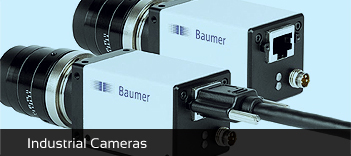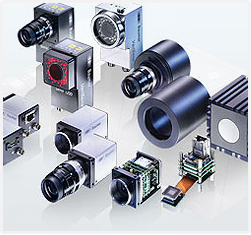Backed by the team of skilled professionals, we manufacture, supply and trade a quality array of Industrial Cameras the Industrial Cameras we offer is widely demanded by the clients for their durability.
Industrial Cameras

Industrial Cameras

Excellent image quality and high frame rates, plus a camera design which enables rapid and flexible integration-Baumer’s digital cameras are developed especially for demanding tasks. Our portfolio includes matrix cameras in color and monochrome versions as well as resolution ranging from VGA to 8 megapixels. The cameras are based on innovative technologies such as CCD and CMOS and include all relevant standard interfaces (Gige Vision®, Camera Link® and FireWire™).
Area of Application:
- Industrial image processing
- Packaging and print inspection
- Metrology and inspection system
- Medical technology
- Renewable energies
- Robotics
- Intelligent Traffic Systems (ITS)
Key Features:
- Matrix cameras for industrial applications
- High resolution and speed
- Innovative functionality
- Multiple interfaces
- Special solutions such as PoE, IP 67 and NIR
- Robust industrial design
- Wide range of accessories from a single source
Frequently Asked Questions (FAQ's)
An Industrial Camera is a durable and high-performance camera specifically designed for use in industrial settings. These cameras are utilized in various industries for tasks such as inspection, measurement, quality control, and automation.
Industrial Cameras are distinguished from consumer cameras by their ruggedness, reliability, and suitability for long-term use in challenging environments. They offer higher resolutions, faster frame rates, sturdier construction, and greater integration capabilities with other industrial equipment.
Industrial Cameras are employed in industries such as manufacturing, automotive, aerospace, electronics, pharmaceuticals, food and beverage, and logistics. They are utilized for applications including machine vision, quality inspection, and process monitoring.
Key components of an Industrial Camera include the image sensor (CMOS or CCD), lens, interface (USB, GigE, Camera Link, etc.), housing, and often additional features such as integrated lighting, filters, and cooling systems.
Industrial Cameras typically utilize either CMOS (Complementary Metal-Oxide-Semiconductor) or CCD (Charge-Coupled Device) sensors. CMOS sensors are more prevalent due to their speed, lower power consumption, and cost-effectiveness, while CCD sensors are known for their superior image quality and sensitivity.
Common interface options for Industrial Cameras include USB 3.0, GigE (Gigabit Ethernet), Camera Link, CoaXPress, and FireWire. The choice of interface depends on factors such as required data transfer speed, cable length, and integration requirements.
The lens plays a critical role as it directly impacts the image quality. It must be selected based on factors such as focal length, aperture, field of view, and compatibility with the camera’s sensor size to ensure optimal performance for the specific application.
Industrial Cameras often incorporate features such as adjustable exposure times, gain settings, and sometimes integrated or external lighting options. Proper lighting is essential for consistent and high-quality image capture.
Typical applications of Industrial Cameras include machine vision for automated inspection, quality control, process monitoring, robotic guidance, barcode reading, and optical character recognition (OCR).
Industrial Cameras improve production efficiency by providing precise and real-time inspection, reducing human error, increasing speed and consistency in quality control processes, and enabling automation in manufacturing lines.
Yes, Industrial Cameras can be seamlessly integrated with other automation systems such as PLCs (Programmable Logic Controllers), robotic arms, and industrial PCs. They utilize standard communication protocols to facilitate integration.
Factors to consider when selecting an Industrial Camera include resolution, frame rate, sensor type, interface type, environmental conditions (temperature, dust, vibration), lens compatibility, and specific application requirements.
Industrial Cameras are configured and controlled through software provided by the manufacturer or third-party machine vision software. Users can adjust settings such as exposure, gain, frame rate, and region of interest (ROI) through these interfaces.
Industrial Cameras are highly reliable when used within their specified operating conditions. They are designed to withstand harsh industrial environments and deliver consistent performance over the long term.
Support for Industrial Cameras can include installation assistance, user training, software updates, troubleshooting, and repair services provided by the manufacturer or specialized service providers.
Regular maintenance of an Industrial Camera involves cleaning the lens and sensor, ensuring proper ventilation and cooling, checking and updating software and firmware, and inspecting cables and connections for wear or damage.
Yes, Industrial Cameras can often be upgraded or expanded with new lenses, filters, and software updates to enhance functionality or adapt to new applications.
Industrial Cameras are constructed with robust housings and may include features such as dust and moisture resistance, shock and vibration protection, and temperature control systems to ensure reliable operation in harsh conditions.







